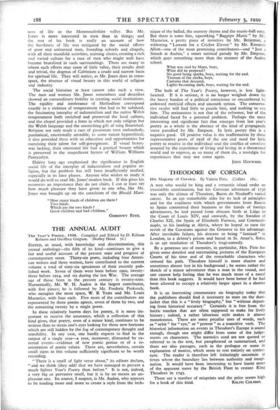THE ANNUAL AUDIT
The Year's Poetry, 1938. Compiled and Edited by D. KiLham Roberts and Geoffrey Grigson. (Bodley Head. is.)
EDITED, as usual, with knowledge and discrimination, this annual anthology—the fifth of its kind—continues to give a fair and useful account of the present state and progress of contemporary verse. Thirty-six poets, including four Ameri- can writers and three women, have contributed to the current volume a total of sixty-six specimens of their recently pub- lished work. Seven of them were born before 19oo, twenty- three before 1914, and six during the last War. The average age of those born in the present century is twenty-nine. Numerically, Mr. W. H. Auden is the largest contributor, with five pieces; he is followed by Mr. Frederic Prokosch, who occupies the most space, W. B. Yeats and Mr. Louis Macneice, with four each. Five more of the contributors are represented by three poems apiece, seven of them by two, and the remaining twenty by a single poem.
In these relatively barren days for poetry, it is more im- portant to receive the assurance, which a collection of this kind gives, that poetry, even of a minor kind, continues to be written than to strain one's eyes looking for those new horizons which are still hidden by the fog of contemporary thought and sensibility. In any case, one hardly expects to find in the output of a single year—a year, moreover, distracted by ex- ternal events—evidence of new poetic genius or of a re- orientation of poetic values. There are, nevertheless, certain small signs in this volume sufficiently significant to be worth recording.
" There is a smell of light verse about," its editors declare, " and we think (they add) that we have managed to present a much lighter Year's Poetry than before." It is not, indeed, a very big or pervasive smell, but it is by no means an un- pleasant one. Its source, I suspect, is Mr. Auden, who appears to be tending more and more to create a style from the tech-
nique of the ballad, the nursery rhyme and the music-hall song.
But there is some fine, squawking "Bagpipe Music" by Mr. Macneice, a pretty piece of invective by Mr. Betjeman, a withering " Lament for a Cricket Eleven " by Mr. Kenneth Allott—one of the most promising contributors—and " Just a Smack at Auden," a smart satirical parody by Mr. Empson, which guys something more than the manner of the Auden school.
What was said by Marx, boys, What did he perpend ?
No good being sparks, boys, waiting for the end.
Treason of the clerks, boys, Curtains that descend, Lights becoming dark, boys, waiting for the end.
The bulk of The Year's Poetry, however, is less light- hearted. If it is serious, it is no longer weighed down by
the heavy burden of a political conscience or encumbered by awkward metrical effects and uncouth syntax. The conserva- tive reader will find little to puzzle him, and nothing to vex him. The seriousness is not that of the reformer, but of the individual faced by a personal problem. Perhaps the most interesting and significant fact that emerges from last year's poetry as a whole is the absence of the kind of propaganda verse parodied by Mr. Empson. In lyric poetry this is a negative good. Of positive value is the reaffirmation by these representative poets of 1938 of the use and need for lyric poetry to resolve in the individual soul the conflict of emotions aroused by the experience of living and loving in a threatened world and to express, as so many of them do, a nostalgia for experiences that may not come again.
JOHN HAYWARD.










































 Previous page
Previous page